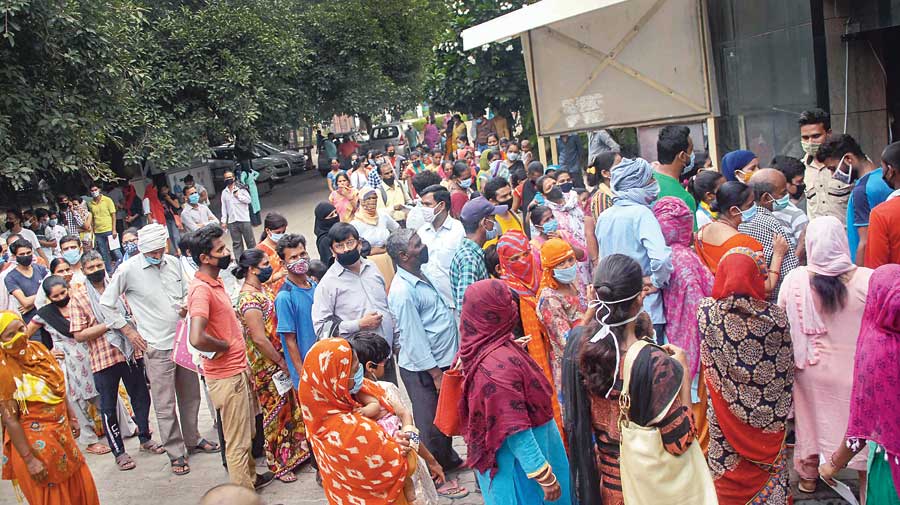Mantasha Bano was 28-weeks pregnant when her cries of sudden, unbearable pain prompted neighbours to call an ambulance in Uttar Pradesh. It never came, and Bano’s baby was stillborn.
Medical workers in the northern state have reported a marked increase in stillbirths as the coronavirus pandemic strains hard-pressed rural health services, including maternity care, in one of the countries worst-hit by Covid-19.
Bano, 22, said she believed her baby could have survived if the ambulance had arrived quickly.
“It was a girl. She was very beautiful. I feel sad, very sad... I had so many dreams and now everything is shattered,” she said.
Coronavirus infections are rising faster in India than anywhere else in the world as the country repeatedly reports the highest global daily caseloads, including a record jump in new cases on Friday.
The World Health Organisation fears the situation could get worse as the virus spreads into the vast countryside, where 60 per cent of India’s 1.35 billion people live.
As the virus stretches manpower and equipment to the limit, state-run health facilities are reserving beds, tests such as ultrasound scans and treatment for critical cases involving Covid-19 or serious accidents, local health workers said.
Workers from the government’s Accredited Social Health Activists (Asha) — usually the first point of contact in rural India — have also been deployed to fight the pandemic.
The situation has forced many women like Bano, who rely on their husbands’ daily wages, to pay for private healthcare.
Renu Singh, an Asha coordinator who has been overseeing 26 villages in Uttar Pradesh, including Atesua where Bano lives, for nearly 15 years, said it was the first time maternal care had been so badly disrupted.
Between March and August, when India was under a months-long national lockdown, she said there had been 22 stillbirths in her area —about four times more than last year.
“We have never seen such a large number of stillbirths in the villages before,” she said, adding that health facilities that once catered to pregnant women had been converted into Covid-19 centres.
She said nutrition units — known as Anganwadi centres — which provide health checkups, medicines, food rations and child and maternal healthcare advice were also shut for months, resuming only irregular operations in July. “All these factors are responsible for the rising cases of stillbirths,” she said.
Worse to come
Jay Pratap Singh, Uttar Pradesh’s health minister, said state health facilities were “fully working” again after the strict lockdown initially affected all medical services.
He told Reuters his department was trying to plug healthcare gaps with various measures, including the recruitment of more radiologists for prenatal ultrasounds.
“The problem (of stillbirths) may be in some areas but not across Uttar Pradesh... Things have smoothened up now,” he said, adding that he did not have up-to-date state-wide birth data.
However, some local medics disagree.
Dr Anil Kumar Dixit, superintendent at a state-run community health centre in Itaunja town near the state capital Lucknow, said his facility had no qualified personnel to operate its ultrasound scanner.
“There are many factors which result in stillbirths and most of them can be prevented easily by getting regular checkups, following doctors’ advice and taking health supplements regularly,” he added.
The WHO recommends at least eight prenatal checkups, one ultrasound before 24 weeks of pregnancy and a daily intake of iron and folic acid supplements to prevent maternal anemia, neural tube defects (NTDs) and preterm birth.
Sarita Gautam, 22, missed several of those steps during her pregnancy, including regular iron supplements for her anemia.
She said she only had two weeks’ supply and struggled to get hold of more as her health clinic was closed to “normal patients”, which also forced her to get an ultrasound privately in June when she was five months pregnant.
“The doctors at the (state-run clinic) told me to come and get the ultrasound done in the ninth month of my pregnancy, but I had lost my baby before that,” she said.
Kusum Singh, an Asha worker who assisted Sarita, said the local state-run facility was only admitting women who were in the last week of pregnancy and reserving ultrasounds for them, leaving others with no choice but to seek private care.
“Many of the families are so poor they cannot afford testing,” Singh said.
The Union health ministry did not respond to repeated requests for comment and nationwide stillbirth data.











